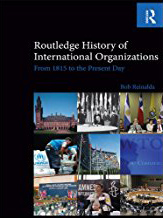In this post, new Centre member Bob Reinalda introduces the IO BIO project as a resource with potential applications for anyone thinking about internationalism.
Biographies of Secretaries-General of International Organizations
 When writing my Routledge History of International Organizations: From 1815 to the Present Day, I realized that important individuals, among them the executive heads of international organizations (IOs), could be dealt with in no more than a few sentences in this volume. Having been an editor of a Dutch biographical dictionary of social movement persons, I realized that these individuals deserved more in-depth coverage so the idea occurred to launch a biographical dictionary of executive heads of IOs to publish short biographies of these individuals and allow for their study as a group. This became IO BIO, the Biographical Dictionary of Secretaries-General of International Organizations, co-edited with Kent J. Kille and Jaci Eisenberg and published in open access (see www.ru.nl/fm/iobio).
When writing my Routledge History of International Organizations: From 1815 to the Present Day, I realized that important individuals, among them the executive heads of international organizations (IOs), could be dealt with in no more than a few sentences in this volume. Having been an editor of a Dutch biographical dictionary of social movement persons, I realized that these individuals deserved more in-depth coverage so the idea occurred to launch a biographical dictionary of executive heads of IOs to publish short biographies of these individuals and allow for their study as a group. This became IO BIO, the Biographical Dictionary of Secretaries-General of International Organizations, co-edited with Kent J. Kille and Jaci Eisenberg and published in open access (see www.ru.nl/fm/iobio).
We set up a database of intergovernmental organizations and their secretaries-general – the term most widely used, but there are similar titles such as director-general, president, high commissioner, administrator – and engaged specialists willing to contribute entries between roughly 1,200 and 3,600 words. So far we have published some 80 entries, covering over 40 organizations, written by almost 60 authors from a wide variety of countries. IO BIO entries cover the entire life and career(s) of an executive head and provide information about archives, publications and literature. Each entry provides an inroad into the organizational history of the IO because it shows what an executive head has attempted to do, with more or less success. A deeper understanding of an IO’s organizational development and leadership by its executive head is revealed as more entries relating to that IO are published. Group analyses are also possible, as recently demonstrated by Dawisson Belém Lopes and João Paulo Ferraz Oliveira, who drew upon the IO BIO database to characterize Latin American secretaries-general of IOs (published in Global Summitry, 2018).

IO BIO, Biographical Dictionary of Secretaries-General of International Organizations, Edited by Bob Reinalda, Kent J. Kille and Jaci Eisenberg, www.ru.nl/fm/iobio
Executive heads belong to the group of international civil servants, a category created at the very beginning of the nineteenth century when the first IOs were set up. The creation of international river commissions (the Rhine Commission in 1815) was followed by public international unions (since 1865) and the League of Nations of 1919, which soon had a variety of specialized organizations, such as the League’s Health Organization. International civil servants represented a new form of internationalism, as individuals with different national and cultural traditions were brought together in international secretariats. As IO employees, they had to make their national allegiance subordinate to their international allegiance: remaining national subjects but working for an IO with common objectives. This tension has been an issue from the very beginning and implied that they needed to have an open and flexible mind. The League of Nations allowed a rapprochement between traditional ‘European’ and ‘non-Western’ diplomatic traditions. International civil servants mixed in the ‘international city’ of Geneva, where several IOs were located, and managed to bridge linguistic, racial and gender differences to a larger extent than in national societies. They formed an elite with a cosmopolitan outlook, with work and private relations resulting in worldwide transnational networks and the international civil service growing in relation to the increase of the number and size of public and private IOs. However, in spite of a concern to ensure an equitable geographical distribution, the League’s secretariat was overwhelmingly European. Representation from the Global South still is an issue in the United Nations System. Hence, the scope of civil servants’ internationalism remains debatable.
Connecting IO BIO to the world of international civil servants demonstrates the value of the project, even if the main focus is on the executive head. IO BIO understands IOs as active actors in international relations, speaking out for the ideas, norms and principles of the organization. The focus on executive leadership helps to build understanding of which policies the organization is pursuing, what bureaucratic culture exists and how and to what extent the executive head is leading, both internally (steering the administration) and externally (playing a role among other international actors, such as states, other intergovernmental organizations, non-governmental organizations and firms). Not all executive heads are strong leaders, but mapping their life and career provides important insights nonetheless.
Additional authors remain welcome for IO BIO, as we continue to publish more entries! Writing a short biography is not as time consuming as writing an article or book and provides a feeling of satisfaction when one covers a full international career. Specialists with regard to an IO or an executive head are invited to write an entry for IO BIO by contacting the editors at iobio@fm.ru.nl. Instructions can be found at the website www.ru.nl/fm/iobio. The editors are readily available to answer any questions and to provide assistance.
Bob Reinalda (Radboud University Nijmegen), b.reinalda@fm.ru.nl